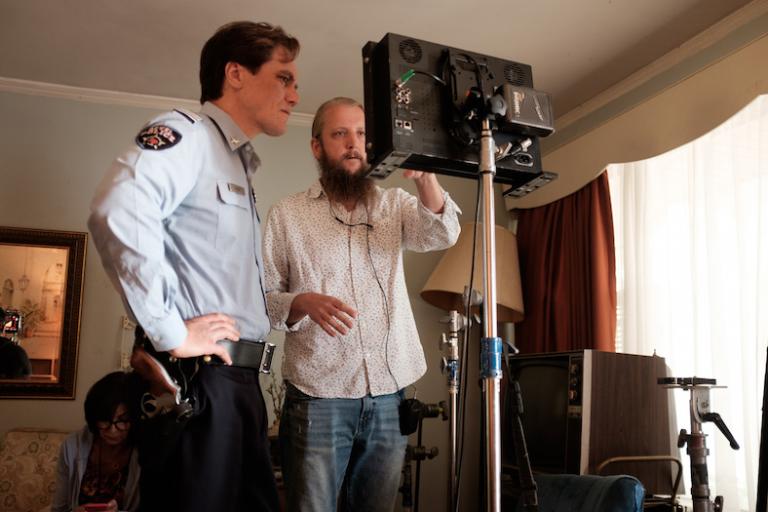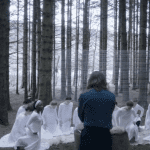
It’s been a strange year for the movie industry, obviously. But while blockbusters have all but disappeared from the horizon, at least for the short term, a number of really interesting films have found their way to the small screen, via video-on-demand. And Scott Teems’ taut, thoughtful The Quarry might just take the early-season prize for 2020’s most spiritually provocative film of the year. (You can rent it through Amazon Prime, Apple, YouTube and a variety of other platforms for about $6.99.)
The Quarry is essentially a slow-boil, cat-and-mouse crime story starring Shea Whigham (as a criminal disguised as a preacher who arrives at a small town in Texas) and Oscar-nominated Michael Shannon (as the suspicious police chief). But the film explores race, violence, the weight of guilt and the liberation, and price, of confession as well.
I have a lot more to say about this movie—which, in spite of its harsh language, is one of my favorite films this year—but for now, I wanted to introduce you to Director Scott Teems, whom I had a chance to talk with recently. We discuss the weirdness of releasing a movie when no one can actually go to it, the actors he worked with and the multilayered—and sometimes contradictory—spiritual themes in play. (The conversation has been edited for length and clarity.)
Paul Asay: Scott, thanks so much for talking with me for a bit. I know you were planning on debuting the film at Austin’s South By Southwest festival this year—plans that sort of went up in smoke with the coronavirus. Now it’s being released to stream through lots of online platforms, such as Apple and Amazon Prime. It must be frustrating to make a movie you can be proud of and then go to Plan D to get people to see it.
Scott Teems: It’s certainly was frustrating and disappointing, for a number of reasons. The film festival experience and the film festival community is very important to me. My first film premiered at South By, so it was kind of a coming home for me, and that’s the festival that kind of launched my career in a lot of ways. I was looking forward to it on a number of levels, so of course it’s disappointing. You also lose the opportunity to get everyone [back] together and really celebrate working on this for over a year. That’s a really valuable and meaningful part of the experience. It makes everything feel complete. And we lost that, and that was unfortunate. In the grand scheme of what’s going on in the world, it’s a small thing. But it still hurt.
That being said, the silver lining is that I think there’s a real opportunity here to reach people in a time of crisis and when they’re looking for stories. Stories are what connect us. Stories are what get us through hard times. I’ve always believed that. And that’s what art does. And it makes us understand what it means to be human, and the necessity of human connection. And how we are connected through our shared stories.
The irony is that I think more people will probably see the movie now that it’s being released in this quarantine time. … Had we had a more traditional release as we were planning on, and if there were other bigger movies opening up at the same time, it would’ve gotten lost maybe. But I think there’s an opportunity for more folks to see it. So that’s exciting.
Asay: I know The Quarry is based on a book by Damon Galgut. What drew you to this story?
Teems: I think I was initially hooked by the premise, which is sort of a classic ‘stranger rolls into town, claims to be someone he’s not.’ It’s like a classic setup: Many stories have sort of been built on that hook. But inside of that hook, it dealt with several themes that are important to me as a storyteller—namely men, violence and religion, and how those ideas intersect or collide. And that drew me in as an opportunity to explore human nature, the weight of guilt, conscience, all these different ideas inside of this tense setup which allowed you to have this sort of propulsive slow-burn plot.
The book was South African, set in post-apartheid south Africa. And by I saw an instant opportunity to translate that to the united states and it felt like a Texas story. It’s a story about big ideas, about racism and God and murder and forgiveness. Our operating motto is that big ideas need a big canvas. And there’s not a much bigger canvas than Texas. That felt like a natural place to set it and talk about these ideas.
Asay: The movie really does spend a lot of time talking about the nature of guilt and ways you can be liberated from that guilt. Is that one of the themes that resonated with you from the book?
Teems: It was certainly a part of it. [The book itself sets up like the movie.] A guy kills a traveling preacher, takes his identity, goes to this small town and gets into this cat-and-mouse game with this police chief: That’s all from the book. But the emphasis in the book was less on the religious aspect and more on the sort of cycle of violence, man’s nature. Those were the themes that he was interested in. And [it was] less about sort of the burden of guilt and how god does or does not play into that. I leaned more into that aspect of it. That’s what interests me.
I come from Georgia and when you grow up in the south, religion is sort of baked into your being. And it’s something that’s sort of accepted as part of our culture. [It’s] an obligation really. Especially when I was a kid. And so when I became an adult, I started to wrestle with my relationship with God and religion and faith, and what it means to me. And that’s sort of come out in a lot of my art, and those are the stories I’m interested in. Because I’m still in an evolving conversation with my faith. I think I always want to be. I want to never stop asking questions. Because if there’s one thing I do believe, is that, if there is a God, then he is not afraid of my questions. Because he’s big enough to handle them.
I’m interested in how in looking at different aspects through a lens of faith and through a lens of violence. They’re so closely related. Look at the biblical imagery. Blood. Blood is love, blood is death, the cross is beautiful the cross is terrible. So much biblical imagery has a duality to it. It has multiple sides. And that’s fascinating to me as a storyteller and as a filmmaker.













